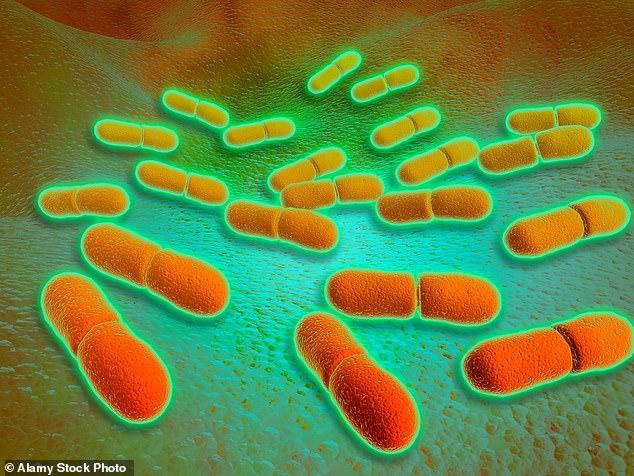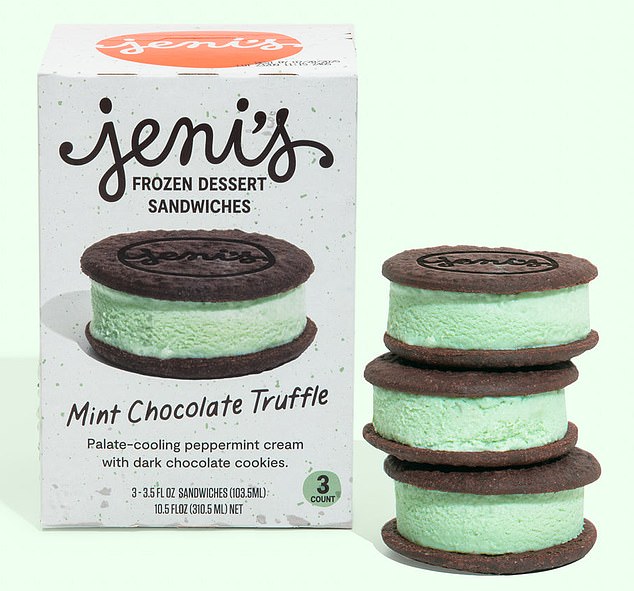Listeria Warning: The Little-Known Signs of Poisoning, Why Pregnant Women Should Be Vigilant, and What to Do If YOU May Have Eaten Contaminated Ice Cream
Thousands of ice creams have been urgently recalled from US supermarket shelves over fears they could be contaminated with listeria.
Food safety watchdogs have placed a ‘do not eat’ warning on more than 70 products manufactured by Totally Cool Inc.
There are fears that the treats – including Friendly’s ice cream cakes, Hershey’s ice cream cones and Jeni’s sandwiches – could contain the bacteria.
The bug can cause a potentially fatal form of food poisoning, with pregnant women at greatest risk. That’s why health chiefs take any indication of an outbreak extremely seriously.
So how concerned should you be and what should you do if you think you’ve eaten a contaminated product?
Here, MailOnline explains everything you need to know.
Totally Cool, a Maryland company that produces ice cream products, has recalled products through the FDA due to a possible listeria outbreak. Friendly’s was among the companies whose products were affected

Hershey’s products are among those distributed nationally through retail and direct delivery that may be contaminated with listeria
What is listeriosis?
Listeriosis is a serious infection usually caused by eating food contaminated with the bacteria Listeria monocytogenes, or L. monocytogenes for short.
The NHS simply calls it ‘listeria bacteria’.
It can be found in moist environments, soil, water, decaying vegetation and animals, and can survive refrigeration and other food preservation measures.
Many foods can harbor the bug, but it is most commonly found in unpasteurized milk, soft cheeses, and ready-to-eat foods such as prepackaged sandwiches.
Cooked shellfish, cured meats and fish, including sushi and pre-cut fruit, also pose a risk.
Infection is usually diagnosed when a laboratory test detects the bacteria in body tissues or fluids, such as blood, spinal fluid, or the placenta.
Why is it such a concern?
Listeria poses a particular danger to the elderly, pregnant women and infants.
In 2022, 167 cases of listeriosis were reported to national surveillance in England and Wales (Figure 1), representing a 6.4 per cent increase in the number of reported cases compared with the average over the previous five years.
Meanwhile, the Centers for Disease Control and Prevention (CDC) estimates that approximately 1,600 Americans contract listeriosis each year in the US.
But experts have long warned that this could be an underestimate because many healthy adults may not seek help for symptoms.
Listeriosis, the infection caused by listeria, can cause serious illness, hospitalization and, in severe cases, death in those most at risk.
Pregnant women are at risk of miscarriage and severe sepsis, while their newborn babies may develop meningitis.
NHS officials are already telling pregnant women to avoid cold-smoked salmon and salted fish products, along with uncooked soft cheeses, unpasteurised dairy products and undercooked foods.
Earlier this year, the U.S. Food and Drug Administration (FDA) completed a multi-year, multi-state investigation into Listeria in two other dairy products – queso fresco and cotija cheese – produced by Rizo Lopez Foods in California.
The outbreak caused 26 cases of Listeria in eleven states, leading to 23 hospitalizations and two deaths.
What symptoms should I look out for?
People infected with L. monocytogenes may begin to see symptoms within a few hours or even two to three days after eating contaminated food.
For most people, listeria poisoning can be similar to the flu and symptoms include high temperature, muscle aches or pains, chills, and nausea or vomiting.
Usually these complaints disappear after a few days.
According to the CDC, it can take three days to three months for more severe forms of listeriosis to develop.
Delayed onset of symptoms mainly occurs in pregnant women.
Confusingly, they may have mild symptoms themselves, but are at high risk of miscarriage due to the infection.
According to the FDA, pregnant women are about 10 times more likely than the general population to get a listeria infection, which is why women who are expecting are told to avoid foods like soft cheese and shellfish.
Infants, the elderly, and people with diseases that compromise the immune system are also vulnerable to life-threatening complications from listeria food poisoning, such as sepsis and meningitis.
Symptoms may include headache, stiff neck, confusion, loss of balance and convulsions.
Treatment depends on the nature and severity of a person’s illness.
Most listeria infections are treated with antibiotics. People with diarrhea should drink plenty of fluids.

Those who eat foods containing listeria develop an infection called listeriosis, which can cause fever, aches, chills, nausea, illness and diarrhea

A few products from the Marco ice cream brand have been recalled. Earlier this year, the FDA concluded an investigation into two other dairy products produced by Rizo Lopez Foods in California. The outbreak resulted in 29 cases and two deaths

Jeni’s Splendid Ice Creams said Totally Cool was a “supplier that produced Jeni’s Frozen Dessert Sandwiches” but does not make other Jeni products at the facility
What should I do if I have eaten a contaminated product?
To date, no illnesses have been reported associated with the consumption of any of the products.
Consumers who have purchased any of the products are asked not to consume them.
Instead, customers must return the products to the place of purchase for a full refund or throw them away.
Customers with questions or concerns about the recall can contact Totally Cool Inc.’s customer service hotline
How can you prevent listeriosis?
Food safety chiefs have long recommended that you wash your hands before, during and after handling food.
Wash utensils, cutting boards and all surfaces that come into contact with food after each use.
You should also store ready-to-eat foods as recommended by the manufacturer.
According to the FDA, appliance thermometers allow you to check whether your refrigerator is at or below 4ºC (40ºF) and your freezer is at 0ºC (0ºF) or below.
Between 4ºC and 60ºC (140ºF) is considered the danger zone, where bacteria can multiply rapidly.
In general, the more bacteria, the greater the chance that someone will become ill.
Most refrigerators can only be adjusted colder or warmer, so the only way to find out is to put a thermometer in it.
